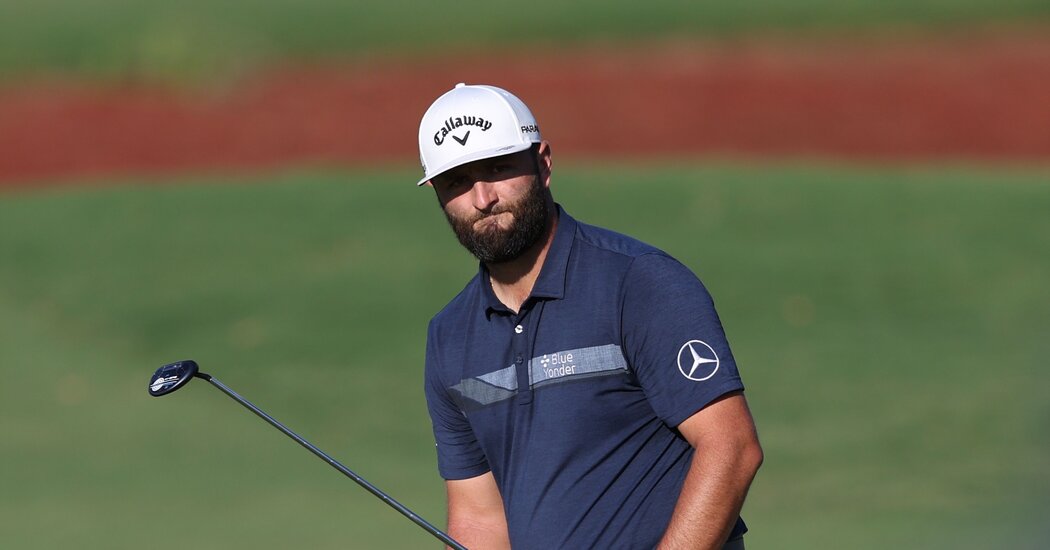The PGA Tour announced on Wednesday that it had reached a deal to raise more than $1.5 billion from a group of U.S. investors, a move that raises new questions about whether a proposed alliance with a rival tour backed by Saudi Arabia’s sovereign wealth fund will come to fruition.
The influx of money into the PGA is led by the Fenway Sports Group, the parent company of the Boston Red Sox and Liverpool Football Club. It comes as the tour is simultaneously negotiating a partnership with its well-funded competitor, LIV Golf.
That deal, which was announced in June, was effectively an acknowledgment by the PGA that it did not have enough money to compete with the hundreds of millions of dollars the Saudi fund was prepared to put in the sport. A number of prominent players had already left the PGA for the LIV tour.
The PGA and the Saudi fund initially set a Dec. 31 deadline to work out details and finalize their alliance. That deadline has since been extended and the partnership between the two tours has not yet been completed. The question now is whether the deal with U.S. investors changes the PGA’s calculus.
The tour’s commissioner, Jay Monahan, said Wednesday on a call with PGA players before the official announcement that the tour “does remain in active and frequent dialogue” with representatives for the Saudi wealth fund. He added that the U.S. investors were “aware and supportive” of its negotiations with the fund. He added that he was in Saudi Arabia a few weeks ago to conduct due diligence on the proposed alliance with executives supporting the U.S. investor group.
The Saudi fund, for its part, has made clear that it will continue to compete with the PGA Tour through LIV Golf if there is no alliance. In December, the Saudi-backed tour poached Jon Rahm, the world’s third-ranked player.
A spokesman for the fund did not immediately respond to a request for comment.
The tentative agreement with the U.S. investors is far less likely to draw fire from clubhouses and Congress than the earth-shattering decision to combine forces with the Saudis. That deal, following months of bitter rivalry, drew criticism over Saudi Arabia’s human rights abuses. The Saudi deal also lacked significant details, almost immediately setting off questions over its durability.
Among the U.S. investors joining Fenway Group are some of the most well-known names in sports and finance: Marc Lasry, founder of the hedge fund Avenue Capital and a former owner of the Milwaukee Bucks; Tom Ricketts, chairman of the Chicago Cubs; Steven Cohen, the New York Mets owner via his family office, the Cohen Group; and Gerry Cardinale, founder of the investment firm RedBird Capital Partners.
For them, the investment is partly a bet on renewed enthusiasm for live sports driven by big technology that has led to deal-making, from tennis to cricket. Investors have long believed they could run the PGA Tour more efficiently.
The negotiations featured an unorthodox challenge: Because the PGA Tour has historically been a nonprofit entity, it has not had a traditional ownership structure.
But the tour is creating a for-profit company to run its commercial businesses. The new investors are expected to wind up with a stake in that business, which executives have named PGA Tour Enterprises.
The PGA Tour Enterprises will now have a 13-person board, seven of whom will be players, Mr. Monahan said on the call. Four members of the U.S. investor group will also join the board, including John Henry, the chief executive of Fenway and Arthur Blank, a co-founder of Home Depot and the owner of the Atlanta Falcons.
Some players will also receive equity in the new company as part of the deal, potentially quieting the uproar that followed the secret talks with the Saudis. The tour also said it was considering allowing PGA Tour members to participate in a program that would enable them to financially benefit from the tour’s success. Under that program, players would be given grants that vest over time based on, among other things, career accomplishments.
“By making PGA Tour members owners of their league, we strengthen the collective investment of our players in the success of the PGA Tour,” Mr. Monahan said in a statement accompanying the announcement.
PGA Tour executives have been scrambling for months to calm players, and even agreed to demands last year for Tiger Woods to receive a seat on the tour’s board, in an effort to limit the power of outside directors.
Mr. Woods spoke in Wednesday’s call with the players, voicing his approval for the deal with the U.S. investors. The call appeared to be an attempt to avoid the frenetic way in which the tour announced its partnership with the Saudis, an announcement that caught most players by surprise.
”Golf is an amazing sport,” Mr. Woods said. “The more we invest into the tour, the more we get the benefits of it.”
Despite player equity, star power and fresh money, Saudi Arabia’s sovereign fund continues to loom over the PGA Tour. Even before its introduction in 2022, it was a danger to the PGA Tour, using big budgets to poach its stars. The Saudi fund later sued the PGA Tour over what it claimed was anticompetitive behavior, and the PGA Tour countersued and framed loyalty to the tour as an act of patriotism.
Then, surprisingly, the Americans and the Saudis sketched a plan to combine their golf businesses. One of that deal’s scant details included an agreement by both sides to drop their respective litigation.
Soon after, PGA Tour executives went before Congress to explain the deal. Among the questions they faced was why it had not sought other investors. And the Justice Department, which had already been scrutinizing the PGA Tour over antitrust concerns, prepared to review the deal. Players were in near rebellion.
The tour then began to open up conversations with U.S. investors, eventually leading to the investment by the Fenway Sports Group and others.

